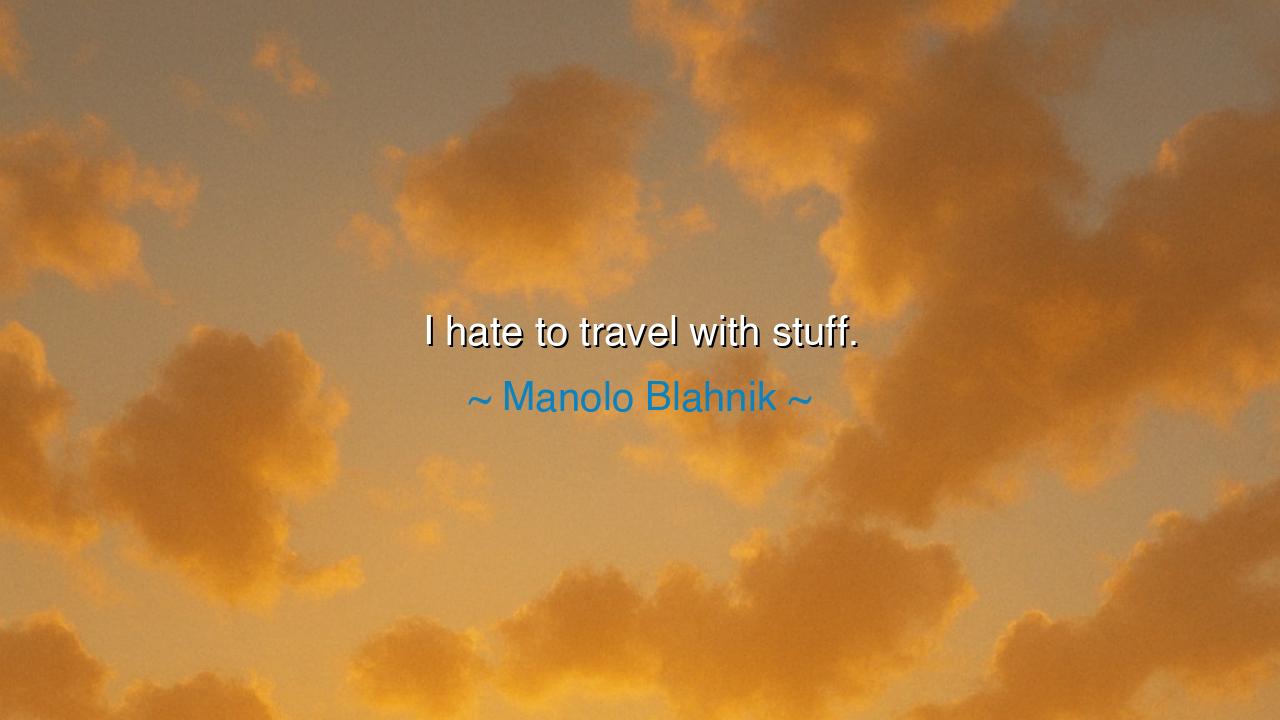
I hate to travel with stuff.






Listen well, O children of the wandering earth, to the cry of Manolo Blahnik, who once declared: “I hate to travel with stuff.” At first hearing, these words may seem but the whim of a designer weary of luggage, yet within them lies a truth as old as the mountains and as urgent as the winds. For the soul that journeys with burdens—whether they be garments, treasures, or the weight of possessions—finds its steps heavy, its spirit clouded, its joy diminished. The one who would travel freely must learn the ancient art of lightness, casting aside what is unnecessary, that his path may be swift and his heart unshackled.
For what is this “stuff” of which he speaks? It is more than bags and shoes; it is the clinging attachment to objects, to excess, to the fear of being without. When man ties himself to his possessions, he becomes like a bird that has adorned itself with jewels yet cannot take flight. How many journeys are ruined, not by the road, but by the burden carried upon it? The wise have always known that freedom lies not in what you carry, but in what you can leave behind.
Behold the tale of Alexander the Great, when his armies, heavy with plunder, began to falter. Seeing their weariness, he commanded that all excess treasures be burned. His men, freed of their golden chains, marched with renewed vigor across the deserts of Persia. What seemed a loss became their strength. Alexander knew that greatness is never found in the abundance of baggage, but in the courage to walk unencumbered toward destiny. Thus do we see that to “hate to travel with stuff” is not mere impatience, but a recognition of the law that freedom and burden cannot dwell together.
Yet let us also look within ourselves. How often do we carry invisible “stuff”? Not only clothes and trinkets, but memories that chain us, regrets that weigh us down, and fears that crowd our packs. These, too, we drag with us on life’s journey, complaining of the difficulty of the road, yet unwilling to lay them down. The teaching of Blahnik becomes then a mirror to our own lives: to travel lightly is to live lightly, to unclench our grasp upon what is needless, and to stride forward with only what gives strength and joy.
But hear me also, O listeners: simplicity is not poverty, nor does lightness mean emptiness. A traveler may carry with him a single garment of beauty, a single book of wisdom, a single memory of love, and this may be enough to warm him more than trunks of useless things. The art is not in renouncing all, but in discerning what is essential. To hate traveling with stuff is to love traveling with soul, to honor the road itself above the baggage dragged upon it.
Therefore, let this be the lesson to all who wander: choose lightness. When you prepare for your journeys—whether across the seas, across cities, or across the days of your own heart—ask yourself: “What do I truly need? What is mere burden disguised as necessity?” Leave behind what does not serve your freedom, and take only what strengthens your stride. Just as the mighty oak sheds its leaves in winter so it may endure, so too must you shed the excess that saps your spirit.
Practical actions follow easily from this truth: pack less, live simply, release what you do not use, and do not bind your worth to possessions. In your home, let there be space; in your mind, let there be clarity; in your heart, let there be freedom. And as you walk through life, remember always the cry of Blahnik: “I hate to travel with stuff.” For these words are not disdain for objects, but love for freedom, for movement, for life lived unburdened.
Thus, O children of the road, be like the eagle who carries only his wings, and the pilgrim who carries only his faith. Cast off your chains, lighten your step, and go forth into the world with nothing but your strength and your wonder—for therein lies the true beauty of the journey.






AAdministratorAdministrator
Welcome, honored guests. Please leave a comment, we will respond soon